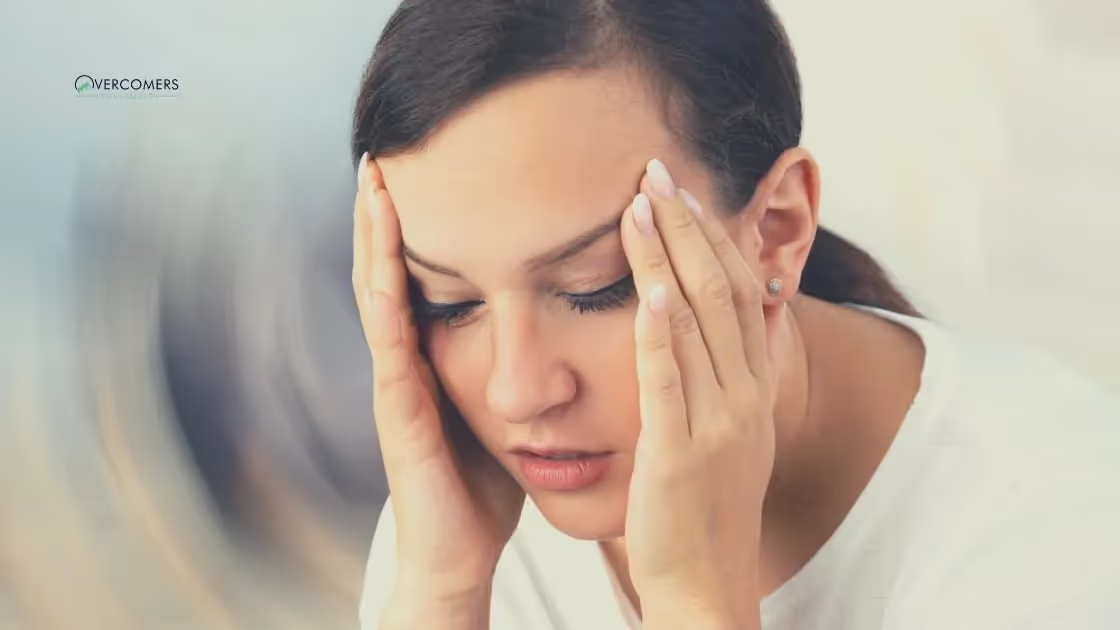Do you feel dizzy when you are anxious?That's because anxiety can cause a range of symptoms such as headaches and vertigo.But why and how can anxiety...

Do you feel dizzy when you are anxious?
That's because anxiety can cause a range of symptoms such as headaches and vertigo.
But why and how can anxiety attacks cause dizziness? Let's dive into how anxiety attacks can cause dizziness.
Read on.
When you're anxious, your body is preparing to go into fight-or-flight mode.
This means it's increasing blood flow to your muscles, which in turn makes your heart pump faster and harder.
This is what causes the racing heartbeat and palpitations that people often experience during an anxiety attack.
You might find that you are feeling dizzy and need to sit or lie down.
And you may still feel uncomfortable and try to change your positioning.
This dizziness may come with a feeling that makes you believe you are in danger.
In severe cases, dizziness can accompany acute and chronic anxiety.
Here is a fact.
Anxiety attacks affect more than 40 million people or 18 percent of the population in the US yearly.
We will be discussing the relationship between anxiety attacks and dizziness, including other common symptoms, and when to seek medical help.
Dizziness is a sensation of being light-headed, faint, weak, and disoriented in space – create a sensation that your environment is spinning and moving.
Dizziness can occur when you are standing still, moving, or lying down.
It can cause you to:
On the other hand, anxiety disorder is a mental health issue.
It makes you respond to situations with extreme fear and dread.
Some physical symptoms may include rapid heartbeat and sweating.
The dizziness that accompanies an anxiety attack can be a symptom of the attack itself, or it can be a symptom of something else related to the attack.
Anxiety attacks can cause dizziness by affecting the way you breathe, causing you to breathe too quickly or too slowly.
The amount of oxygen in your blood then drops, which affects how your brain functions.
This causes dizziness, along with other symptoms such as fatigue and weakness.
Anxiety attacks also affect your brain chemistry by releasing hormones into your bloodstream that cause stress and increase your heart rate.
This makes it difficult to control your emotions, which leads to feelings of panic and fear.
If you are feeling anxious because of some event in your life (such as the loss of a loved one), then this could trigger an anxiety attack and lead to dizziness as well.
Some forms of anxiety are normal and don't call for medical attention.
For example, if you are faced with a difficult situation at work, making an important decision, waiting for a test result, or waiting for an interview.
Anxiety can also be a good thing.
For example, it helps us to stay alert in danger and look for a possible way to stay safe.
Some causes of anxiety disorders are:
During this time the body goes through many physiological changes that are designed to help you survive the perceived threat. These changes cause numerous symptoms throughout the body, including dizziness and vertigo.Vertigo is a sensation where the ground or surrounding is spinning rapidly which causes you to lose balance.
So, how do you know if you are experiencing dizziness from an anxiety attack?
If you have been feeling anxious for a long time and then suddenly start to feel lightheaded or your heart starts to race, it could be a sign that something else is going on besides just anxiety.
Anxiety attacks can come on suddenly and they usually last less than ten minutes but they may last longer depending on how severe they are.
Some people feel like they're going to pass out or even vomit when having their first attack!
You should see a doctor as soon as possible if any of these symptoms occur during or after an anxiety attack so that proper treatment can be given right away before things get worse!
When you have an anxiety attack, your body thinks it's under attack.
It reacts by releasing adrenaline into your system. Adrenaline causes your body to react in a variety of ways, such as:
- Your heart beats faster
- Your blood pressure increases
- You burn energy more quickly
All of these changes are responsible for some form of dizziness during an anxiety attack.
For example, increased heart rate and blood pressure can cause lightheadedness or fainting during an attack.
The increase in energy burn can cause your muscles to become fatigued more quickly than normal, which can lead to the feeling that the room is spinning (vertigo).

The main difference between acute anxiety and chronic anxiety is the time duration.
Frequent feeling of dizziness is simply known as chronic dizziness.
While acute dizziness is characterized by a short-term episode of dizziness that may occur during anxiety attacks or when you stand up too quickly.
Treatment of dizziness depends on the condition that caused it.
For chronic dizziness caused by an inner ear disorder, the following treatment options may be helpful:
Dizziness which results from an underlying anxiety disorder can be relieved with treatments like:
The relationship between anxiety attacks and dizziness is reciprocal, meaning that anxiety attacks can cause dizziness, and dizziness can cause anxiety attacks.
In many cases, it has been known that anxiety and dizziness go hand-in-hand, which can produce an endless pool of symptoms.
Dizziness is one symptom that can be caused by many different things, so it is important to know what triggers it in order for you to treat yourself appropriately.
If you are experiencing dizziness from an anxiety attack, try breathing exercises such as yoga or meditation before seeking medical help.
By knowing and treating the underlying cause (physical or psychological), you can ease the symptoms of dizziness which helps to improve your quality of life.
If you are having streaks of dizziness that persists and interferes with your daily activity, then you need a medical examination.
Running a medical examination will bring to light the main cause of these symptoms, and treating them can help reduce or eliminate the symptoms.
However, the cause of dizziness may be unknown which may indicate an underlying issue like anxiety.
If so, then you may be directed to a therapist or other mental health practitioners for treatment.
So, to conclude our answer to the question, can an anxiety attack cause dizziness?
Yes, dizziness is a common symptom of anxiety.
Although dizziness can be a side effect of some medications or a result of an inner ear problem (often the result of an infection), it's usually due to stress and anxiety.
When you're stressed out, your body responds in various ways.
The physical response to anxiety includes a lot of changes that affect your breathing, heart rate, digestion and more.
All of these changes can be responsible for dizziness when you have an anxiety attack.
Seek medical attention if you feel one or more of the symptoms in this article.
To reduce your anxiety, you can practice relaxation techniques such as deep breathing, progressive muscle relaxation, guided imagery, and mindfulness practices. Additionally, regular exercise has been found to be beneficial in managing stress and improving mental health.
Other activities which have been found helpful in reducing both immediate feelings of anxiousness and long-term anxieties associated with chronic disorders include yoga, journaling, nature walks, art therapy, volunteering, and other low-stress activities. Additionally, developing a healthy lifestyle incorporating adequate sleep, physical activity, and nutritious meals can help reduce overall stress levels.
Ignoring anxiety can exacerbate symptoms and make it more challenging to manage over time. This can result in a negative impact on your personal, professional, and social life, leading to feelings of isolation and even depression.
It's important that you feel comfortable discussing personal matters with your therapist in order to open up and get more out of therapy sessions; therefore finding someone who meets certain criteria like experience level, expertise areas, and personality is key when selecting a therapist who can give meaningful feedback about how best handle issues related to anxiety or other mental health concerns.
The duration of anxiety counseling varies for each individual, depending on the severity of their anxiety and their progress in therapy. Our therapists will regularly assess your progress and adjust your treatment plan as needed.
Addressing anxiety is crucial because it can significantly impact your quality of life and overall well-being. Left untreated, anxiety can lead to more severe mental health issues, relationship problems, and difficulty functioning in daily life.